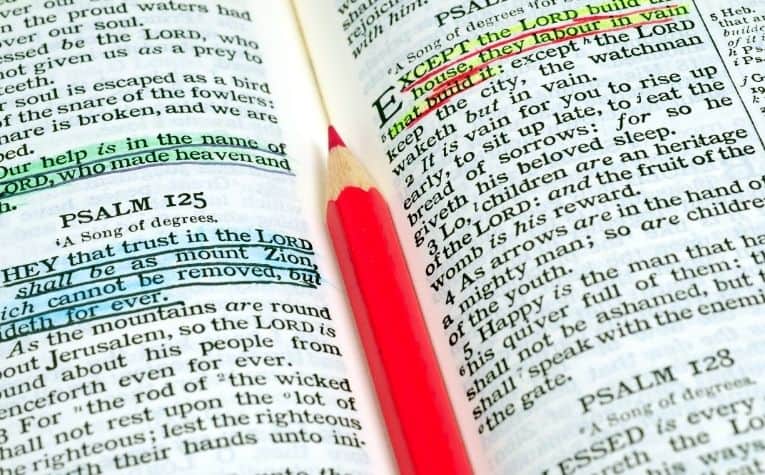There are different types of Bible commentaries because the people who use them have different needs and purposes. Some readers are scholars, others are pastors, and still others are Christians looking to study the Bible on their own. Common ways to categorize Bible commentaries include:
- Reading level: Is it introductory, mid-level, or advanced and scholarly?
- Content: Is it devotional, expositional and homiletical, exegetical, historical, theological, technical, or something else?
- Theology: Is it Arminian, Reformed, Baptist, or Pentecostal? Is it amillennial, premillennial, postmillennial, or something else?
Any single commentary may be described using terms from each of these categories. For example, a particular commentary on Romans may be simultaneously described as devotional, theological, and Arminian. Or, a particular commentary on Revelation may be described as scholarly, technical, and amillennial. Keep reading to learn more, see examples, and find the resources that are right for you.
This website helps readers identify which commentaries are best for their purposes. See The Top 50 Bible Commentaries Series to learn more.

Reading Level: Introductory, Mid-Level, and Scholarly
All kinds of people use commentaries to enhance their study of the Bible. Scholars use commentaries, and so do new Christians, though they often use very different volumes.
The former may be looking for insight into the original languages; the latter may be looking for a devotional aid. It’s important for readers to select a commentary based on their experience level.
Introductory Bible commentaries
Introductory Bible commentaries don’t assume that the reader has any prior knowledge of the Bible. Authors take time to explain the text in ways that are easy to understand, including any history or theology that the reader may need to know in order to understand a verse, passage, or book of Scripture.
Sometimes readers assume that “introductory” means superficial, and so they avoid these commentaries because they want to do an “in-depth” Bible study. Introductory commentaries aren’t necessarily superficial concerning content; rather, their starting points are foundational, not mid-level.
Do pastors use introductory commentaries?
Yes. Introductory commentaries can be helpful to pastors because such volumes present information in ways that anyone can understand. This helps pastors put their preaching and teaching “on the lower shelf” so anyone can understand it.
Sometimes it’s challenging for preachers and teachers of the Bible to make certain concepts easy to understand, and consequently, they fail to connect with some hearers. Introductory commentaries can help them with this. Examples of introductory commentaries:
The book of Revelation is perhaps the most popular book of Scripture for which people want to own a commentary. See the best Revelation commentaries to learn more.
Mid-level Bible Commentaries
Mid-level commentaries, as the name suggests, are more advanced than introductory commentaries but less advanced than scholarly volumes.
Any reader can utilize a mid-level commentary, but those who don’t have much experience reading biblical studies resources may progress at a slower pace, and there are many concepts that are difficult to understand.
Mid-level commentaries are the most popular kind of Bible commentary. Pastors generally favor them to help them with preaching and teaching. Many of the best-reviewed commentaries for each book of the Bible are mid-level.
A true “intermediate” option, mid-level commentaries are generally insightful and practical and meet the needs of serious, content-driven Bible studies. Examples of mid-level commentaries:
After the book of Revelation, the book of the Bible that people want to own a commentary on is Romans. See best Romans commentaries to learn more.
Advanced and scholarly commentaries
Scholarly commentaries focus on the original languages of the Bible and recent biblical scholarship. These volumes aren’t intended for Sunday school classes, small groups, devotional reading, or discipleship ministries. Authors of scholarly commentaries often assume that their readers have knowledge equivalent to a seminary education.
Yet even then, not all seminary graduates prefer scholarly commentaries because their ministry purposes don’t require ongoing work with the original languages or recent biblical scholarship.
Some scholarly commentaries aren’t even necessarily designed for pastors. There is a saying in academia: “Scholars write for other scholars.” This may be an overstatement, but there is some truth to it.
Even if authors of scholarly commentaries hope that at least some pastors and formally trained laypeople will benefit from their work, they are aware that their readers will most likely be colleagues. Examples of advanced and scholarly commentaries:

Content: Exegetical, Devotional, Theological, and More
Please note: Readers will notice that there is some overlap in the description of different commentary types, for it’s challenging to describe an “introductory” commentary, for example, without describing its content in some part. Yet there is a clear distinction in the next section from the previous one, which will become clear when it’s read.
Devotional commentaries
Devotional commentaries are mostly introductory in relation to their reading level. Devotional commentaries focus on the reader’s “devotional life” or spiritual life, i.e., their growth in Christ-likeness, their pursuit of holiness, and similar topics related to their sanctification.
Authors provide a basic explanation of Scripture in devotional commentaries, but it’s not as in-depth as exegetical commentaries. Their focus instead is on personal reflection. Examples of devotional commentaries:
- Christ-Centered Exposition Commentaries (link above)
- Focus on the Bible (link above)
- The Bible Speaks Today (link above)
Expositional or homiletical commentaries
The words “exposition” and “homiletics” relate to preaching and sermons. This type of Bible commentary, which is introductory in relation to the reader, reads like printed sermons, though they are slightly edited to remove “ums” and similar vocal speech patterns.
Illustrations, quotations, stories, and analogies are common in this type of commentary because many preachers use those teaching techniques when preaching sermons.
Some readers use expositional commentaries as devotional aids because they are very similar to hearing sermons, which are designed not only for understanding but also for application and reflection.
Do pastors like expositional commentaries? Many pastors like expositional commentaries for two primary reasons:
- They can learn how another pastor preaches a particular verse, passage, or book of the Bible. In essence, pastors seek wisdom when using these kinds of commentaries in relation to preaching, which other kinds of commentaries may not offer.
- Some pastors use expositional commentaries as devotional aids. Preachers give sermons, but they don’t always hear sermons themselves. Expositional commentaries can help with this.
Examples of expositional or homiletical commentaries:
Whole-Bible commentaries are great for starting a personal library. See Best One-Volume Bible Commentaries: The Top 25 to learn more.
Exegetical commentaries
Exegetical Bible commentaries aim to explain the meaning of the text, which is to say, the author’s original intent.
An exegetical approach to Scripture includes examining subtopics like the author’s biography and background, the first recipients’ identity, the historical and social setting, the date of composition, and the literary genre.
The goal isn’t to compile a list of facts but to learn the author’s intent, in other words, what the text means.
People who use exegetical commentaries may have the goal of applying the text. Still, their conviction is that to understand what the passage means for the 21st century, readers must first understand what it meant to readers in the 1st century. Examples of exegetical commentaries:
Many well-known pastors and theologians have written commentaries. See the most Famous Bible Commentaries to learn more.
Thematic commentaries
Thematic commentaries, which are mostly mid-level in relation to reading level, approach the text with a narrower focus than other commentaries.
Themes may include focusing on just the theology of a particular book, or just the socio-cultural background of a book, or just the teaching or preaching of a book. Examples of thematic commentaries:
Technical commentaries
Technical commentaries, which are advanced or scholarly in relation to reading level, focus on the original languages of biblical books and recent biblical scholarship related to the book.
Technical commentaries seldom offer readers devotional reflections or application suggestions, though there are exceptions.
Authors of technical commentaries discuss not only the meaning of original-language words but also the grammar and syntax as well. Authors often parse the original-language words and phrases for readers and discuss what inferences can be drawn from such analyses.
As mentioned above, scholars often write for other scholars, and many pastors prefer mid-level commentaries over technical ones. Examples of technical commentaries:
- Hermeneia (link above)
- International Critical Commentary (link above)
Theology: denomination and doctrinal perspectives
All theological traditions and denominations produce commentaries because they each desire to express their beliefs to willing readers. For example,
- Baptist commentators have written introductory, mid-level, and advanced commentaries, and so on.
- Arminians have written devotional, exegetical, and technical commentaries, and so on.
Sometimes a commentary series may be devoted to one theological perspective. For example,
- As the name implies, the Reformed Expository Commentary series is written from a Reformed perspective.
Other commentary series may employ a Reformed author for one book, a Baptist author for another book, and a Pentecostal author for yet another book.
Only learning more about commentary series and individual volumes can help readers understand the approach of a particular commentary. This website aims to help people do that.
Please note: Some denominations have a greater tradition of producing commentaries than others, which can lead to an imbalance in the marketplace.
Examples of theological commentaries:
- Reformed Expository Commentary – Calvinist (link above)
- New American Commentary – Baptist (link above)
- Abingdon commentaries – Arminian
Do commentary users read outside of the theological tradition?
It’s very common in the world of biblical studies resources, like commentaries, for people to read outside of their tradition.
Some readers prefer to read only within their tradition. Nevertheless, it’s conventional for people who use biblical studies resources to use and praise resources that are written by believers with different convictions on the secondary matters of the faith.
Presumably, people who read outside their tradition do so with discernment, but it’s more common than not in the world of commentaries to read inside and outside of one’s tradition.
What Are Critical Commentaries?
Disclaimer: Admittedly, the definition and description of critical commentaries that I give below are debatable. Critical biblical scholars, in particular, would likely take issue with part of it or all of it. Nevertheless, it reflects my conviction and viewpoint.
In critical bible commentaries, authors often don’t accept the biblical text at face value. Instead, authors argue that the text has been manipulated in some way — edited, enhanced, erased, etc. — before acquiring its current and final form. “Criticism” can take on many different forms like:
- Literary criticism
- Historical criticism
- Textual criticism
- Theological criticism
Moderately-critical commentaries: Sometimes commentaries are described as moderately-critical, which means that the authors assume that the text is truthful in relation to faith and practice only.
Liberal-critical commentaries: Other times, commentaries are described as liberal-critical. Authors of these volumes believe Scripture can and does, contain errors. They may also be critical about matters that Scripture affirms, doctrinally, theologically, or otherwise.
Bible commentaries are plentiful. See How Many Bible Commentaries Are There? to learn more.
Also see:
References:
[1] www.biblegateway.com
[2] www.openbible.info
Related Questions
Whole Bible commentaries will help you understand every passage of Scripture better. If Bible commentaries on single books are like studying individual trees, whole-Bible commentaries will help you...
With so many Bible commentary series available today, many people want to know which ones are best. There is a wide variety of commentary series today because readers have various purposes for using...
